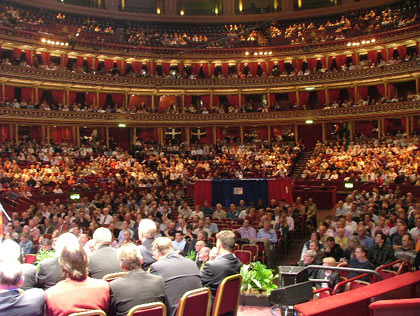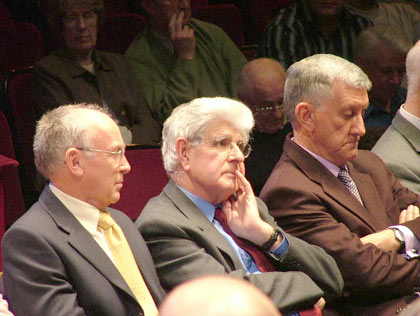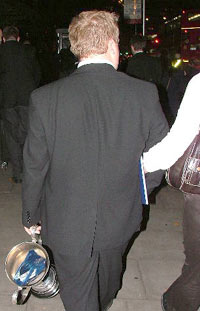2005 Besson National Championships of Great Britain - A Kensington Postcard
18-Oct-2005The Royal Albert Hall is the biggest and best place to win a brass band contest - even when you do it with a bit of a conjurors trick.
Why is it that the banding world has such a fascination with the Royal Albert Hall?
It is not the best place to play for sure, and has an acoustic that would make an aircraft hanger sound like the whispering gallery in St. Paul's Cathedral, whilst the price of a couple of pints of beer and a ham sandwich makes the type of dent in your wallet only a woman on a shopping trip for a wedding outfit can usually match.

Royal Albert Hall, London: Results time...
The reason though is simple: There is no better place in the whole wide world in which to win a brass band contest.
For instance, the Australians may have Sydney Opera House, but that has only recently been brought up to scratch after a multi million dollar refurbishment, after it was initially put together on the cheap by Aussie builders and politicians who didn't want to fork out the money to build it in the way the architect wanted. Who wants to win a brass band contest in a place that was built out of MDF and plastic bags anyway.
Go to anywhere in the world, and the Brits come out on top. New Zealand - pah! France – not on your nelly. Norway? Not a bad place in Bergen, but anywhere that has a ceiling that looks like the tongue logo of the Rolling Stones isn't a place you should take too seriously. No, for all its faults, you just cannot beat the Royal Albert Hall. Its big, its beautiful and most of all – it's as British as good Queen Victoria and her husband who it commemorates. He's even outside keeping an eye on it too.
And this year it revealed itself in all its glory. The doors opened early and after the obligatory search through you bags you could part with your hard earned cash in a whole variety of ways. The study scores were a crisp tenner a piece – a bit steep for many, but they were rather better than those on sale at half the price in Birmingham, and they didn't have a four page insert of adverts either. The programme was three quid, but that too wasn't too bad. You only got apoplexy when you wanted to go and get something to eat and drink in the little bars dotted around the hall.
It would have made more sense if the barman had been wearing a mask and a black and white striped shirt. This was daylight robbery. We know London is a dangerous old place at times, but to be accosted by a footpad disguised as a waiter and given less than a fiver back for four bottles of beer and two packets of crisps is a bit much at the best of times.
Still, you pay your money you takes your choice.
At those prices it also meant that more people stayed in the hall to actually listen to the bands. There were very few mass evacuations on the day, although one or two bands must have thought there was either a sale on at the Kensington branch of MFI.
The hall was not full this year – but when was the last time it was? The best audience figures were for the final few bands – Dyke and Grimethorpe, when it appeared to be about two thirds full. By all accounts just over 3000 tickets had been sold for the event – not bad when you consider the place holds just over 5000.
Leyland and Russell Gray won't be complaining though will they? Everyone thought they were going to hear a battle royal between Black Dyke and BAYV with a supporting cast of YBS, Grimey and Brighouse perhaps, but they all rather forgot that Leyland has been winning top notch prizes with some regularity of late.
Given that they were playing in London thanks to a large extent to the financial help they were getting from Cadbury's, who paid for their hotel accommodation and also enough to pick up the tab for a new set of famous white jackets – this really was a dream come true. This was a shock of sorts – but not a 240 volt frazzle your underpants type of shock. More a quick jolt and a shake of the arm type of thing.

The 3 Degress: Messers Berryman, Read and Brownbill
What was a bit of a shock was some of the remarks given by the judges though. Saying that they had their doubts about the piece when they received the score was one thing, but to then to say after the contest they now thought it to be a fantastic piece, was another. When exactly did they change their minds?
By all accounts they had the chance to listen to a pretty poor quality CD by the band at the Guildhall School of Music which was them playing through the piece on one days rehearsal. So was that enough to make them change their minds? Or did they listen to the first few performances and then see the light?
It was a rather strange response to make and made the odder by the fact that not one of the three had contacted the composer to ask about his score and his thoughts about the piece prior to the contest, with the exception of them being at the pre contest talk Dr Pickard gave on the Friday night. It seems very odd that on such a piece they were not given more time to listen to the work at length or to work more closely with the composer.
He himself told 4BR he would have been delighted to have explained about the technical aspects and the construction of the work to the men in the box. He didn't mind them not liking his music if that was then their opinion, but not to understand it and then change their minds after hearing a few decent performances was something else. He seemed genuinely bemused by their reasons and explanations.
This was the musical equivalent of what happened with the architect of the Sydney Opera House, Jorn Utzon all those years ago. No one listened to what he wanted and they went ahead and built (arguably still a pretty good looking building), something that bore little internal resemblance to what he wanted and resulted in him never goning back to even visit his great visionary achievement. We can't afford to allow that to happen with Dr Pickard and Eden can we?
 It was just another one of those little things that stuck in the memory banks this year. That and the sight of Russell Gray walking arm in arm with his wife Marieka down Kensington High Street with the Stanley Boddington Cup in his one hand watching two members of Leyland Band struggle with the half ton case containing the most famous brass band trophy in the world being wheeled to the nearest pub for one heck of a celebration.
It was just another one of those little things that stuck in the memory banks this year. That and the sight of Russell Gray walking arm in arm with his wife Marieka down Kensington High Street with the Stanley Boddington Cup in his one hand watching two members of Leyland Band struggle with the half ton case containing the most famous brass band trophy in the world being wheeled to the nearest pub for one heck of a celebration.
It was as if he was overseeing the transportation of a heavyweight midget in a conjurors box.
The thing was though – he had already produced the greatest trick in his entire conducting career. He had made the National title disappear right from under the noses of the people who thought they knew how the trick worked themselves. All that, and he had done it on the biggest and best brass band contest stage in the world.
Iwan Fox















